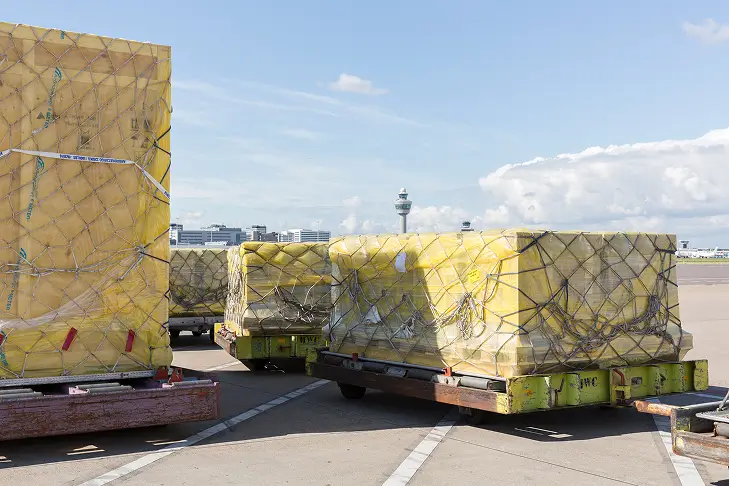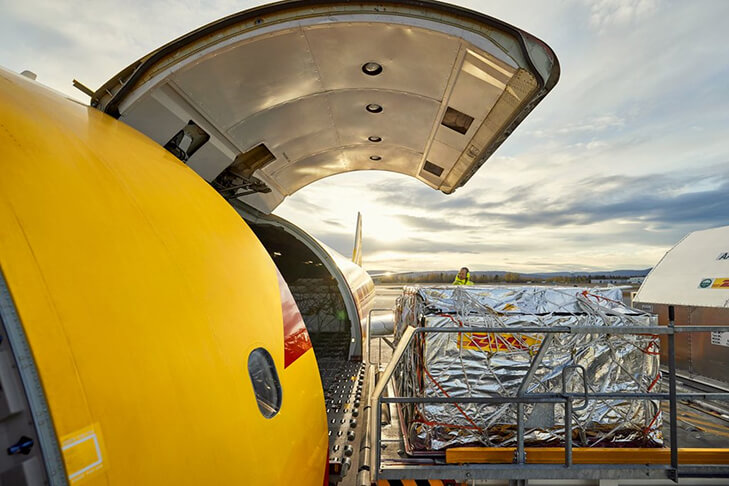For logistics managers and supply chain professionals, timing is everything. Delays in critical shipments can halt production lines, causing costly downtime that disrupts business continuity and harms client relationships. Whether you're handling pharmaceutical cold chains, coordinating manufacturing components, or facing supply chain emergencies, cargo charter solutions offer rapid and reliable freight transport when traditional methods fail.
At Schiphol Airport, Fliteline recognises these urgent pressures. We specialise in solving complex logistics challenges, connecting businesses with the right aircraft for immediate freight delivery. From managing humanitarian aid to supporting emergency manufacturing, cargo charter services bridge the gaps that traditional freight networks can't cover.
When every minute counts, conventional logistics planning falls short. Cargo charter solutions keep your operations on track.
The Reality of Crisis Logistics
It's 2 PM on a Friday, and your production line has stopped. A vital component is stuck in a port 3,000 miles away due to shipping delays, and your plant manager is demanding solutions. In automotive manufacturing, every hour of downtime can cost between €45,000-€60,000 (£38,000-£51,000) according to industry studies. Sound familiar?
At Fliteline, we tackle these challenging situations directly. When traditional freight networks fail and time is running short, our cargo charter services become your operational lifeline. Whether it's on the manufacturing floor or in humanitarian relief zones, we offer aviation solutions that transform impossible deadlines into successful deliveries.
When Natural Disasters Meet Supply Chain Chaos
In March 2025, Myanmar faced a severe logistics crisis. A devastating earthquake struck amidst ongoing civil unrest, making conventional freight movement nearly impossible. Blocked roads, compromised ports, and already disrupted ground transport networks by conflict added to the challenge.
This situation required a solution beyond conventional logistics: bypassing damaged infrastructure completely. Aviation partnerships managed to deliver over 51 tonnes of essential medical supplies. They transported shelter repair kits, solar lamps, and mosquito nets to isolated communities unreachable by trucks or ships.
This operation stood out not just for its humanitarian impact but for its operational complexity. Teams navigated multiple jurisdictions for flight permissions, collaborated with international relief organisations, and maintained safety protocols in a conflict zone. The Airbus Foundation's detailed account illustrates how aviation expertise created pathways where none existed before.
For logistics professionals, this scenario highlights a vital principle: when supply chains face disruption, cargo charters not only bridge gaps but also open entirely new routes to success.
The Red Sea Crisis: When Shipping Routes Disappear Overnight
The Red Sea shipping disruptions of 2025 caused a major crisis familiar to supply chain managers globally. Ships had to reroute around Africa, adding up to ten days to deliveries and over €1.2 million (£1 million) per voyage in additional costs.
Industries dependent on just-in-time manufacturing faced severe impacts. Automotive plants experienced component shortages, electronics manufacturers saw production lines stop, and pharmaceutical companies struggled with temperature-controlled supply chains.
Cargo charters filled these critical gaps by swiftly moving essential components and replenishing inventories when ocean freight couldn't keep up. This wasn't about luxury or convenience—it was about business survival as traditional logistics networks directed capacity to longer, costlier routes.
For a deeper understanding, refer to this comprehensive analysis of 2025's biggest supply chain risks, which shows how geopolitical disruptions continue to challenge traditional freight planning.
Understanding the Operational Reality Behind Emergency Charters
Moving urgent cargo involves more than just booking a plane. At Fliteline, we handle every detail to ensure your goods arrive safely, on time, and in perfect condition:
Choosing the Right Aircraft
Every cargo type needs a specific solution. Temperature-sensitive pharmaceuticals require climate-controlled environments. Oversized machinery needs special loading setups. Hazardous materials need certified handling procedures. We match your cargo needs with the right aircraft, considering destination runway requirements and ground handling facilities.
Navigating Regulations and Compliance
International cargo transport involves many regulatory steps. Overflight permissions, customs documentation, and import/export requirements must work together seamlessly. Our experience across different regions helps us anticipate potential delays and plan alternative routes if needed.
Coordinating Ground Logistics
The aircraft is just one part of the solution. Successful cargo charters need smooth coordination between ground teams at both departure and arrival points. This includes special loading equipment, secure storage facilities, and customs clearance that meets your timeline.
Real-Time Communication and Tracking
When time is tight, visibility is essential. We provide constant updates on flight progress, weather conditions, and any changes. Your stakeholders stay informed, and you maintain full control over the entire process.
ROI Justification: Making the Business Case for Strategic Charter
Logistics professionals often need to justify cargo charter investments to senior management. The key lies in understanding when charter delivers measurable return on investment through risk mitigation and operational continuity:
Production Continuity Value Analysis
Manufacturing downtime costs vary significantly by industry, but studies show automotive production lines can lose €45,000-€60,000 (£38,000-£51,000) per hour when halted. In pharmaceutical manufacturing, delays can cost even more due to batch losses and regulatory implications. A cargo charter costing €35,000-€50,000 (£30,000-£43,000) that prevents significant production delays often delivers immediate positive ROI whilst protecting customer relationships and market reputation.
Regulatory Compliance Protection
Missing regulatory deadlines can trigger substantial penalties. EU pharmaceutical regulations, for instance, can impose fines reaching millions of euros for delayed critical medicine deliveries. Import compliance failures can result in port detention fees of €2,000-€5,000 (£1,700-£4,300) per day. Government agencies and industry regulators seldom accept "shipping delays" as valid reasons for non-compliance.
Competitive Advantage Through Supply Chain Resilience
Companies maintaining operational continuity during disruptions often capture market share from competitors facing delivery failures. This strategic positioning can generate revenue protection worth multiples of charter investment, particularly in industries where reliability differentiates market leaders.
Risk Diversification Investment
Diversifying logistics options reduces dependency on single freight methods. Having established charter relationships means you're prepared when conventional options fail, rather than sourcing emergency solutions at premium crisis pricing. This strategic approach typically reduces overall logistics risk costs.
Our Cargo Charter Service overview explains how we structure these solutions to deliver measurable business value alongside operational reliability.
The Fliteline Approach to Crisis Logistics
Our team at Schiphol knows the pressure logistics professionals face when typical solutions fail. We've fostered relationships with operators worldwide because we understand the importance of having options when time is tight.
We do more than just arrange aircraft; we deliver complete solutions tailored to your specific needs:
- 24/7 communication support to keep stakeholders informed throughout
- Transparent pricing with comprehensive cost breakdowns and no hidden fees
- Proactive risk management, including weather contingency plans and alternative routing
- Regulatory expertise across various industries and international jurisdictions
Our comprehensive Aircraft Guide helps you understand different cargo capabilities. Our insights on air cargo charter transformation show how the industry evolves to tackle modern logistics challenges.
Building Strategic Partnerships for Operational Resilience
The most effective logistics operations strategically combine multiple freight methods rather than relying solely on conventional options. Cargo charter serves as both emergency backup and proactive solution for time-critical requirements.
Consider building relationships with charter specialists before crises occur. Understanding capabilities, response times, and cost structures during calm periods ensures you're prepared when urgent situations arise. This preparation often determines whether supply chain disruptions become minor inconveniences rather than major operational crises affecting bottom-line performance.
Creating Pathways Through Your Next Challenge
Whether you're managing pharmaceutical cold chains, supporting manufacturing operations, or coordinating emergency response supplies, cargo charter solutions fill the gaps when regular freight options fall short.
The key is partnering with specialists who understand your operational pressures and regulatory demands. We excel at transforming complex logistics challenges into manageable solutions, using aviation expertise that only genuine specialists can provide.
Frequently Asked Questions About Cargo Charter Services
How quickly can cargo charter services be arranged?
Emergency cargo charters can often be arranged within hours, depending on aircraft availability, cargo requirements, and destination. For urgent situations, we maintain relationships with operators who can respond rapidly to time-critical requests. Standard cargo charters typically require 24-48 hours for complete coordination, including regulatory approvals and ground handling arrangements.
What types of cargo can be transported via charter services?
Cargo charter aircraft handle virtually any freight type, including temperature-sensitive pharmaceuticals, oversized industrial equipment, hazardous materials, and time-critical manufacturing components. Each cargo type requires specific aircraft capabilities and handling procedures, which we coordinate based on your exact requirements and regulatory compliance needs.
How do cargo charter costs compare to commercial freight rates?
Cargo charter rates typically range from €15,000-€150,000 (£13,000-£128,000) depending on aircraft size, distance, and cargo requirements, compared to commercial freight at €2-€10 (£1.70-£8.50) per kilogram. However, when factoring in downtime prevention, regulatory compliance protection, and business continuity assurance, the total cost equation often favours charter for time-critical situations. When production downtime costs €50,000 (£43,000) per hour, a €40,000 (£34,000) charter preventing delays delivers immediate ROI whilst safeguarding customer relationships.
Which aircraft types are used for cargo charter operations?
Aircraft selection depends on cargo weight, dimensions, destination runway capabilities, and range requirements. Options include converted passenger aircraft, dedicated freighters like Boeing 747Fs and 777Fs, and specialised cargo aircraft such as Antonov transporters for oversized shipments. Our Aircraft Guide provides detailed specifications for different cargo requirements.
What documentation is required for international cargo charters?
International cargo movement requires comprehensive documentation including commercial invoices, packing lists, airway bills, export/import permits, and customs declarations. For specialised cargo, additional certifications may be needed, such as dangerous goods declarations or pharmaceutical transport validation. We coordinate all documentation requirements to ensure smooth customs clearance at destination.
Can cargo charters handle temperature-sensitive or hazardous materials?
Yes, cargo charter services accommodate temperature-controlled pharmaceuticals, chemical shipments, and other specialised freight requiring specific handling procedures. Aircraft with climate-controlled cargo holds maintain precise temperature ranges, whilst certified dangerous goods handling ensures regulatory compliance throughout the journey.
How reliable are cargo charter services compared to commercial freight?
Cargo charters offer significantly higher reliability than commercial freight networks because the entire aircraft is dedicated to your shipment. There's no risk of bumping for higher-priority cargo, no missed connections, and no capacity constraints that delay delivery. Weather and regulatory factors can still affect timing, but dedicated aircraft provide maximum control over the transport process.
What happens if weather delays affect my cargo charter?
Weather contingency planning is standard for cargo charter operations. We monitor meteorological conditions continuously and prepare alternative routing options when primary destinations face adverse weather. Communication protocols ensure you receive real-time updates on any delays, revised timelines, and alternative solutions to minimise operational impact.
What geographic coverage do cargo charter services provide?
Cargo charter services reach virtually any destination with appropriate airport facilities. This includes remote locations inaccessible to commercial freight networks, conflict zones requiring specialised coordination, and destinations where commercial capacity is limited or unavailable. Global operator networks enable cargo delivery to any location with runway access.
Conclusion
Handling crisis logistics complexities requires more than experience—it demands strategic partnership. At Fliteline, we serve as your trusted aviation advisor, tackling unique challenges with custom cargo charter solutions designed to protect your operational continuity and financial performance.
Our mission extends beyond moving cargo; we create pathways that provide peace of mind and empower decision-makers with reliable, cost-effective freight options when every minute matters. When facing logistical challenges that threaten business continuity, our commitment to understanding and supporting your operational and financial requirements remains unwavering.
Partnering with Fliteline means having a knowledgeable ally in aviation, ensuring your operations continue smoothly regardless of external circumstances whilst delivering measurable value that justifies investment decisions.
Ready to explore cargo charter solutions for your logistics challenges? Contact our team for a consultation and discover how we create reliable pathways through your most complex freight requirements.
Every cargo charter we coordinate represents someone's critical deadline, essential supplies, or business-saving solution. We take this responsibility seriously, applying genuine aviation expertise to ensure your goods reach their destination safely, securely, and precisely when needed.
Get in touch with any questions about your air charter needs



